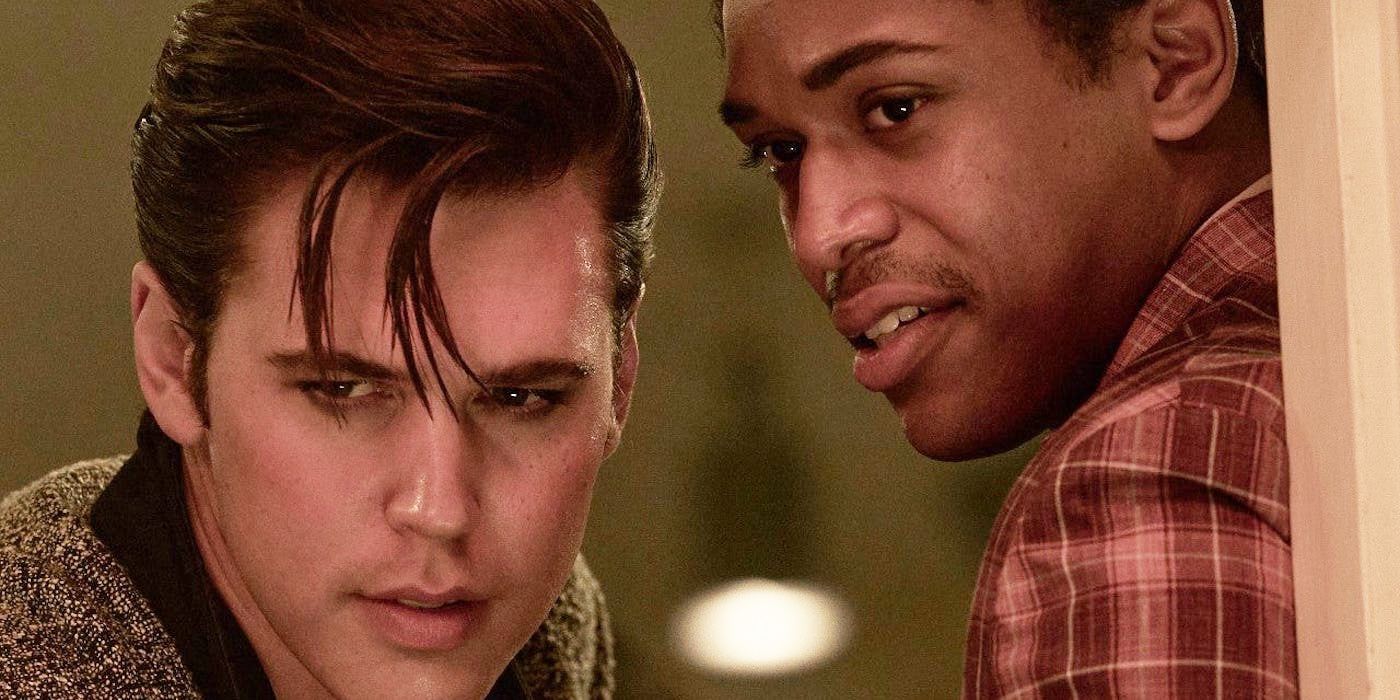
Were Elvis & B.B. King Really Friends? The True Story Is Complicated
Baz Luhrmann’s Elvis shows the young “King of Rock and Roll” hanging out with blues legend B.B. King, and the film has sparked debate over the true story behind the two icons. In Luhrmann’s trademark style, Elvis is a dizzying and dazzling two-and-a-half hours that weaves together old and new. However, many have claimed that the film misrepresents Elvis’ role as a civil rights advocate and inflates his relationships within the Black community, namely with B.B. King.
As shown in Luhrmann’s biopic, Elvis grew up in a poor, dominantly Black community in Tupelo, Mississippi where he discovered his life-long musical inspiration at the local gospel church. Elvis and his family then moved to Memphis in 1948. From the ages of 14 to 18, Elvis lived with his family at Lauderdale Courts, an apartment complex where the young musician could walk to Beale Street. Peter Guralnick, author of Last Train to Memphis, says (via The New York Times) that Elvis’ years at Lauderdale Courts were “absolutely seminal,” and claims that Elvis’s strolls frequently led him to both Beale Street and to Memphis’ Main Street where he would watch late-night gospel concerts.
It is on the famous Beale Street that Elvis (played by Austin Butler from Tarantino’s Once Upon A Time In Hollywood) meets up with B.B. King in Luhrmann’s Elvis. The pair pal around, joke, and marvel at the incredible music before King gives Elvis advice about the music industry. Elvis unmistakably shows Elvis and King as friends, a relationship that King himself verified several times throughout his life.
What B.B. King Has Previously Said About Elvis

Born in a river cabin in Berclair, Mississippi, B.B. King told a reporter in 2010 (via the San Antonio Examiner), that he felt a kinship for Elvis because both of them “were born poor in Mississippi, went through poor childhoods and we learned and earned our way through music.” That kinship and mutual struggle fostered a friendship between Elvis and King (played in Elvis by Cyrano’s Kelvin Harrison Jr.), with the pair frequently talking music together. In the interview, King discusses how he and Elvis agreed that “Music is owned by the whole universe. It isn’t exclusive to the black man or the white man or any other color. It shared in and by our souls…” King continues, “I told Elvis once, and he told me he remembered I told him this, is that ‘music is like water. Water is for every living person and every living thing.‘”
In King’s autobiography, Blues All Around Me, King also recalls how Elvis orchestrated a show for him at the Hilton Hotel in 1972. King claims (via the San Antonio Examiner) that Elvis “put in a call” and booked King a show in the lounge while Elvis played in the hotel’s main theater. This was likely difficult for Elvis who had long been under the thumb of his tyrannical manager Colonel Tom Parker (a.k.a. “The Snowman”). However, this was something Elvis did several times throughout his career. King speaks fondly about their shows together, saying that they would often wind up in Elvis’ suite after the shows, talking and playing music. “I’d play Lucille (his guitar) and sing with Elvis, or we’d take turns. It was his way of relaxing’…’We were the original Blues Brothers because that man knew more blues songs than most in the business – and after some nights it felt like we sang everyone one of them.”
Why Elvis & B.B. King’s Friendship Is Up For Debate

Despite King’s frequent claims, the Elvis movie’s accuracy in regard to the friendship between Elvis and B.B. King is still a matter of hot dispute. Author Alanna Nash, who has written several books about Elvis, claims (via USA Today) that King and Elvis were only “acquaintances,” and that their association was nothing but brief interactions, a view that King’s writings and numerous interviews seem to strongly refute.
Meanwhile, others, like former music editor for Pride Magazine, Helen Kolawole, claim that Elvis appropriated the songs of Black artists getting rich and famous from other’s work. On that idea, King has also spoken out, writing in his autobiography (via Vanity Fair) that “Elvis didn’t steal any music from anyone. He just had his own interpretation of the music he’d grown up on, same is true for everyone. I think Elvis had integrity.”
So, while Baz Luhrmann may catch criticism for Elvis, the film seems to portray a version of Elvis and B.B. King’s friendship that is at least accurate to the latter’s portrayal of the nuanced situation. Though it is unclear whether the pair ever hung out on Beale Street together as they do in the film, King’s words and writings imply that the two legendary artists maintained a friendship throughout Elvis’ career. Furthermore, King’s recounting of the mutual respect between him and Elvis, and Elvis’ unending love for Black music, seems to corroborate many aspects of the larger-than-life yet tragic character portrayed in Luhrmann’s Elvis.































![iFi's GO Bar Kensei Dongle DAC Supports K2HD Technology With Some Samurai Swagger [Updated] iFi's GO Bar Kensei Dongle DAC Supports K2HD Technology With Some Samurai Swagger [Updated]](https://i0.wp.com/cdn.ecoustics.com/db0/wblob/17BA35E873D594/33FF/45A11/QTXOLJR4xDKSNMMk2WlTgjaIlvSgcYpeU1xJzUwIoYs/ifi-go-bar-kensei.jpg?w=768&ssl=1)






















